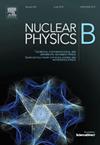IF 2.5
3区 物理与天体物理
Q2 PHYSICS, PARTICLES & FIELDS
引用次数: 0
摘要
最近,根据全息暗能量(HDE)形式主义的广义截止,提出了一种四参数广义熵。正如奥丁佐夫(Odintsov)等人最近的研究所示,在适当的参数限制下,它可以还原为各种已知的熵。在目前的工作中,我们在熵宇宙学的框架内研究了宇宙早期和晚期的演化,在全息暗能量和四参数广义熵(Sg)等价的框架内重建了熵能量密度函数。在这方面,我们还研究了不同的熵暗能量模型,包括有 Nojiri-Odintsov(NO)截断的广义全息暗能量、巴罗熵暗能量(Barrow entropic HDE,BHDE)和作为红外截断的查里斯熵暗能量(Tsallis entropic HDE,THDE),它们都是最广义的四参数熵全息暗能量的三种特殊情况。受野尻等人工作的启发,我们目前的工作报告了对宇宙学参数和热力学的研究,其中包括对宇宙学视界熵和黑洞熵的熵修正,以及高度广义粘性耦合全息暗流体及其特殊情况。本文章由计算机程序翻译,如有差异,请以英文原文为准。
Thermodynamics of the most generalized form of holographic dark energy and some particular cases with corrected entropies
A four-parameter generalized entropy has recently been developed based on the generalized cut-off of holographic dark energy (HDE) formalism. It reduces to various known entropies for appropriate parameter limits, as shown in recent studies by Odintsov and others. In the current work, we investigate the evolution of the universe in its early and late phases within the framework of entropic cosmology, where the entropic energy density functions are reconstructed within the framework of the equivalence of holographic dark energy and four-parameter generalized entropy (). Also, we examined different entropic dark energy models in this regard, including the generalized holographic dark energy with Nojiri-Odintsov(NO) cut-off, the Barrow entropic HDE (BHDE), and the Tsallis entropic HDE (THDE) as IR cut-off, all of three particular cases of the most generalized four parameter entropic holographic dark energy. Inspired by the works of Nojiri and others, our current work reports a study on cosmological parameters and thermodynamics with entropy corrections to cosmological horizon entropy as well as black hole entropy with a highly generalized viscous coupled holographic dark fluid along with its particular cases.
求助全文
通过发布文献求助,成功后即可免费获取论文全文。
去求助
来源期刊

Nuclear Physics B
物理-物理:粒子与场物理
CiteScore
5.50
自引率
7.10%
发文量
302
审稿时长
1 months
期刊介绍:
Nuclear Physics B focuses on the domain of high energy physics, quantum field theory, statistical systems, and mathematical physics, and includes four main sections: high energy physics - phenomenology, high energy physics - theory, high energy physics - experiment, and quantum field theory, statistical systems, and mathematical physics. The emphasis is on original research papers (Frontiers Articles or Full Length Articles), but Review Articles are also welcome.
 求助内容:
求助内容: 应助结果提醒方式:
应助结果提醒方式:


